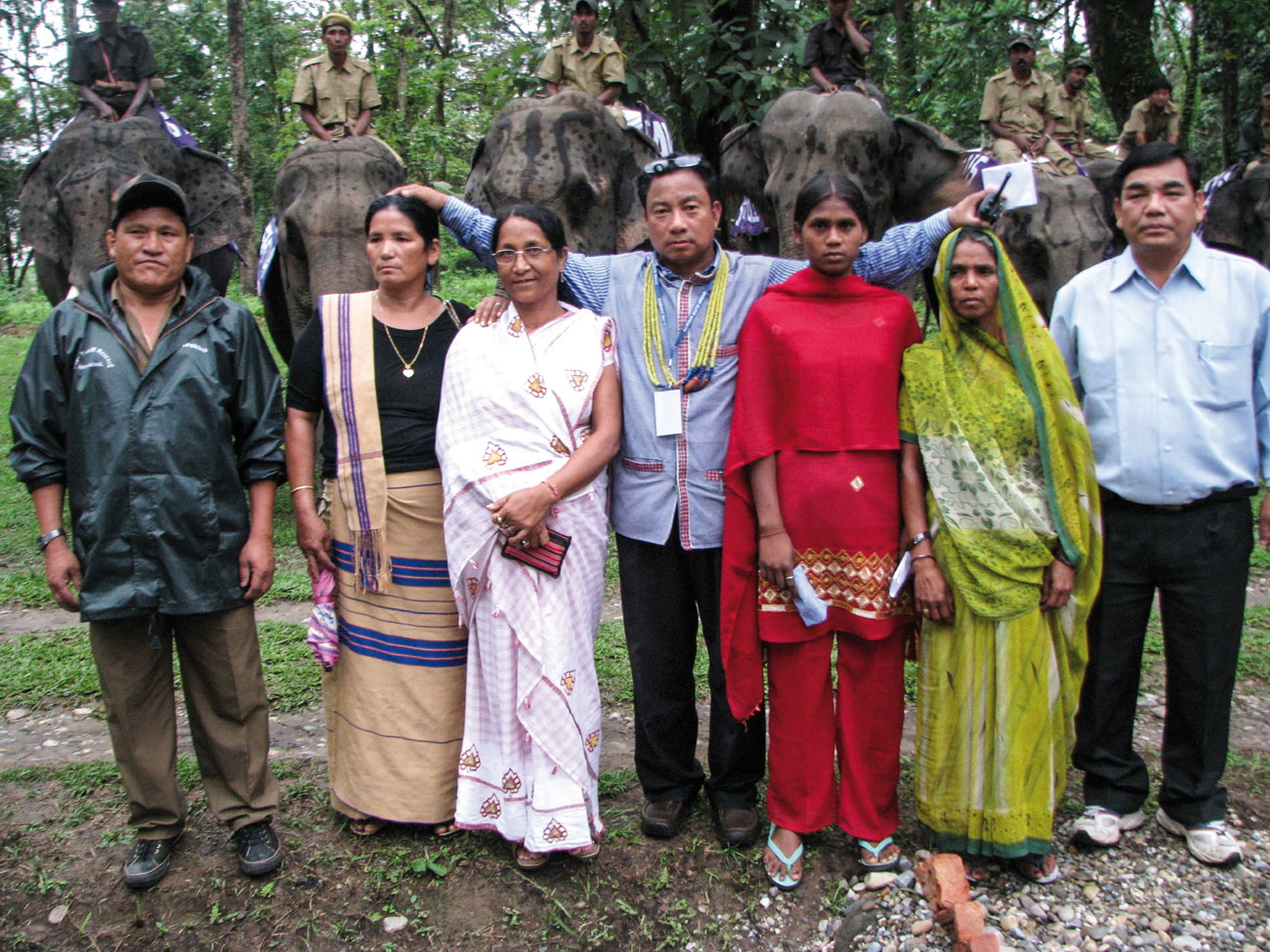A Quiet Man
First published in Sanctuary Asia,
Vol. 43
No. 12,
December 2023
By Pranav Capila and Nandini Velho
The life and times of Tana Tapi, legendary D.F.O. of the Pakke Tiger Reserve, Sanctuary Wildlife Service Awardee (2010), who retired from active service this October.
Four Changs On A Hill Top
The boy grows up in a village called Mop Pop in the Papum Pare district of Arunachal Pradesh. It is a tiny village, the kind that doesn’t even have a pin code. The world outside may be swingin’ in the ‘60s, but Mop Pop is just four changs on a hill top, surrounded by forests.
He has a large family. His father, Tana Bodu, has seven wives, a reflection (in that era) of his high standing in the Nyishi tribal community. The boy’s mother is the first wife; he is the younger of her two sons and he is, consequently, pampered by her.
_C-1300_1701855953.jpg)
Tana Tapi at the Pakke Tiger Reserve, which flourished under his leadership and guidance. Photo: Pranav Capila.
She dies when he is just eleven. She gets malaria, prayers are offered, but without access to modern medicine she is gone within a week. His elder brother cares for him, making sure he is fed and clothed and doesn’t stray from his studies. His first school is just a room in the village, where he and other children learn under the light of bamboo torches for a couple of hours each night. When he is a little older he starts going to the Primary School in Yadang, 12 km. away.
Through hard times he learns to persevere. His family has little but his needs are few; he roams wild and free like the mithun and sambar he sees in the jungles as he walks to and from school every day. He works hard, he is admitted to the Middle School in Doimukh and later the Government Higher Secondary School in Itanagar, taking a job as a Lower Division Clerk so he can stay in a government hostel in the city.
After school comes a fork in the road. The post of Sub-Inspector of Police beckons. Fortuitously, he is introduced to J.K. Mehta, Conservator of Forests. “You are from a forest area, beta,” Mehta tells him. “You should join the Forest Department and help us save forests.” Somehow, almost despite himself, he is hooked. He interviews for the post of Forest Ranger and is accepted to the Eastern Forest Ranger College in Kurseong, Darjeeling.
The Ranger Who Pushed Back
P.T. at 4:30 a.m., then a hike through the jungle with a rock-filled rucksack. Species identification, wildlife tracks and signs, aspects of commercial forestry. The classes at Kurseong are tough; the instructors, several of them ex-armymen, instil a sense of rigour. Bit by bit, the quiet, determined boy becomes the quiet, determined man.
He is formally inducted into the Forest Department on July 1, 1984. Now he is Tana Tapi, Range Forest Officer. A year later he is posted to the Mebo Range of Pasighat Division. The timber mafia here is ruthless; they have no fear of forest officers. But this one steely-eyed Ranger starts pushing back. “I made every effort to disrupt their operation – stepping up patrols, conducting raids on illegal sawmills,” he says. “To me, it was unacceptable that they could run rampant in my range.”
One night, they attack his residence. A group of men, armed with lathis, break down the door, grabbing hold of him, threatening to kill him if he doesn’t back off. He wrestles free, runs to his room and grabs his government-issued double-barrelled gun. The men flee.
His wife is with him at the time, and their one-year-old daughter. Fearing for their safety, he sends them home. He decides his family will no longer accompany him on his postings. For the next 35-odd years, wherever he goes, he goes alone.

Tana Tapi (centre) with the widows of forest guards. He believes keeping the frontline staff motivated and happy is vital, and has become a father figure for them. Photo: Nandini Velho.
In 2002, after 18 years as a Ranger, he is promoted to the rank of Assistant Conservator of Forests (ACF). A new door is opened; he is selected for a Post Graduate Diploma in Wildlife Management at the Wildlife Institute of India (WII), Dehradun. “None of our tribal boys have specialised in wildlife management,” S.K. Mukhopadhyaya, the Deputy Conservator of Forests (Wildlife), tells him. “You will be the first.”
At the WII course he enjoys the field assignments the most. Kaziranga, Gir, Periyar, Palamau – he travels to Protected Areas (PAs) across the country, learning about conservation challenges and how they are tackled. He has hiking competitions with Dr. A.J.T. Johnsingh in Rajaji. He tranquilises a hog deer during a wildlife rescue session in Kaziranga.
When he returns to Arunachal in 2004, he is told to proceed to Seijosa. Now he is Tana Tapi, Divisional Forest Officer of the Pakke Tiger Reserve.
One With The Jungle
A few months into his tenure, he assembles a motley crew of seven men. They cross the Tippi river and set up camp on an outenga tree, where the Bhalukpong Ghat anti-poaching camp now stands. From Bhalukpong Ghat to Denai, Diji, Nameri West and Upper Dekorai, then finally to the Forest Rest House at Khari. Across the breadth of Pakke in 10 days, scouting for spots where patrolling roads and anti-poaching camps can be established. Heading off at 6:00 a.m., hacking through the jungle with their daos (machetes), walking all day, sometimes barefoot to feel the earth. Making camp before sundown, under fallen logs by riversides, up trees and on cliff-sides to keep out of reach of elephants.
Along the way, he sees hunting camps lining the riverbanks and nullahs. So complete is the poachers’ control over Pakke that different gangs have different flags on their changs to demarcate ‘their’ territory.
He knows the Forest Department needs to establish its authority in the PA. The frontline staff are afraid, demoralised. But there is virtually no patrolling infrastructure, and virtually no funds to develop it. “Kaam zaroori hai; karna hai,” he tells himself – “The work is essential; it must be done.” So, they do it themselves. Their camp elephants trample the forest and the officers and frontline staff, all hands on deck, walk behind them, clearing the route with their hands and daos. Bit by bit, the road is made jeep accessible up to Upper Dekorai. Dr. Rajesh Gopal, who heads Project Tiger at the time, visits in 2005; amazed at the work already begun, without any financial support, he calls Tana Tapi to Delhi to figure out how to help Pakke.
This first bit of collaborative labour becomes a long-term template for building and maintaining infrastructure at Pakke. The frontline staff, most of whom are employed on a contract basis, are given the opportunity to do the work themselves. Funds saved by not employing private contractors are ploughed back towards staff welfare. Repairs to anti-poaching camps, new uniforms and equipment, food rations, medical treatment, a staff picnic by the riverbank, school fees for someone’s children – the money saved is there to be utilised.
“Keeping the frontline staff motivated and happy is vital,” he tells his Rangers. “Staff ko khush rakhna hai, bas.” He is strict with his men, sometimes heavy-handed, but he has their love and trust. He becomes a father figure to them; handling the arrangements for this one’s marriage, solving that one’s family dispute. He walks the jungle with them, stays in their camps, shares their meals, sings Kishore Kumar songs with them. He performs the last rites of those who lose their lives. He builds a memorial to honour them.
-and-Parvati-(right)-(2)_C-1300_1701856265.jpg)
Tana Tapi with Sanker and Parvati, two orphaned elephant calves that he helped raise. Photo: Rita Banerji.
Keeper Of Paradise
When it comes to Pakke and those who help nurture it, he has a soft core beneath his steel. To researchers he is a friend and mentor, he supports and leads, indelible partnerships are formed.
He reaches out to and works with several NGOs: Wildlife Conservation Trust provides patrolling vehicles, food rations, uniforms for staff. A Grain-for-Grain scheme with Wildlife Trust of India helps fringe communities get in-kind compensation for wildlife-related crop losses. Nature Conservation Foundation pioneers a Hornbill Nest Adoption Programme as well as a Nature Education Programme for local schoolchildren. Titli Trust produces Butterflies and Moths of Pakke Tiger Reserve. A consultative Tiger Conservation Plan is written.
Gradually, year by year, Pakke begins to flourish. Poaching is all but eliminated and there is round-the-clock patrolling. Over 40 anti-poaching camps are constructed and patrolling routes developed where there were virtually none. Bridges are built with the neighbouring tribal communities – the Ghora Aabhe society is formed to involve gaon burrahs, village elders, in conservation outreach. Local youth from fringe villages are employed as Special Tiger Protection Force personnel.

Photo: Parul Lavakare.
Throughout his 16 years as DFO, he fights for Pakke. He is persistent with the babus in Itanagar to release staff salaries on time. Despite political pressure, he is unflinching in warding off destructive proposals in sensitive areas – an ITBP camp in the Dezzling elephant corridor, the Kameng and Pappu Hydel Projects, the 48.8 km. road that would slash through the tiger reserve.
Now that he has retired, what would his legacy be? The frontline staff, the researchers, the people from local communities whom he trained, mentored and befriended, for sure. His children, of course – and to them he offers the most Tana Tapi bit of praise: “They are all doing well. I am satisfied.”
But then there is Pakke itself, which has seen its fair share of challenges in the last few years. Invited to attend the Forest Martyrs Day (September 11) ceremony at the Tiger Reserve this year, he said, in a voice choked with emotion for once: “It doesn’t matter if nothing new is built, but what was built over 16 years – the patrolling effort, the infrastructure, the team – let at least that be preserved.”
Even if Tana Tapi is owed nothing, Pakke, the forest that he loved and which he helped claw back from the brink, deserves our collective best. “Kaam zaroori hai; karna hai… It must be done,” as Tana Tapi would have said.
Pranav Capila is an editor and writer who tells stories about wildlife, wild spaces, and unsung heroes on the frontlines of conservation. Nandini Velho is a conservation scientist and Project Lead at Canopy Collective supported by the ORA India Programme. She won a Sanctuary Wildlife Service Award in 2015.


_C-1300_1701855953.jpg)

-and-Parvati-(right)-(2)_C-1300_1701856265.jpg)
